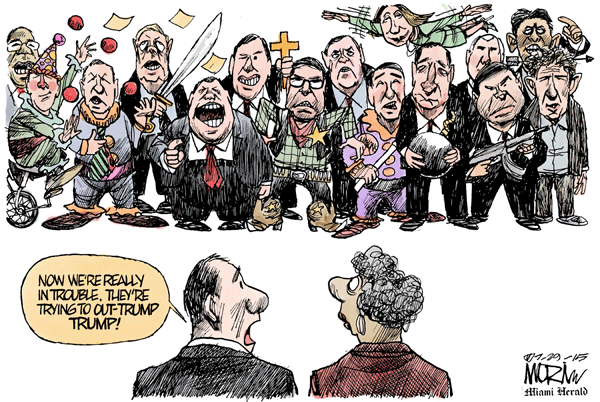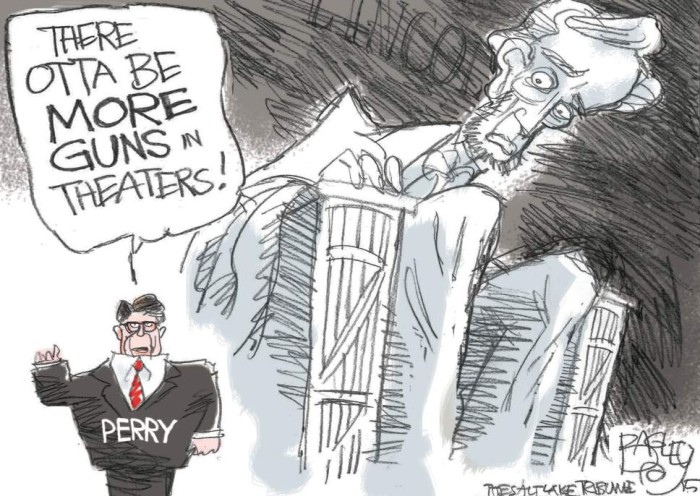[I’m quoting an article by Jim Wright from Stonekettle Station in its entirety (minus the addendum, which you should go read).]
“The reality is that John McCain the politician has made America less safe, sent our brave soldiers into wrong-headed foreign adventures, covered up for President (Barack) Obama with the VA scandal and has spent most of his time in the Senate pushing amnesty. He would rather protect the Iraqi border than Arizona’s.”
– Donald Trump, USA Today OpEd, 7/20/2015
Just stop with the fake outrage.
You’re not fooling anybody, Republicans, not even yourselves.
Donald Trump?
You’re mad at Donald Trump?
Because he disparaged John McCain’s military service.
Saturday, during a campaign stop in Iowa, Trump took a shot at Senator John McCain
He’s not a war hero. He’s a war hero because he was captured. I like people that weren’t captured.
Gasp.
I can’t believe Trump said that out loud. Oh how terrible. How insulting…
… If you’re a liberal.
Sure, liberals. Aren’t they the sissy sensitive ones? Always insulted and upset by blunt talk? Of course, you can see how liberals would be upset by Trump’s opinion of that loser McCain.
But conservatives? C’mon.
They hate that politically correct shit. Having to be polite. Diplomatic. Mind other people’s feelings. Watch your words. All that faggy sissy bullshit. Go cry me a river.
Well, you know, unless somebody calls Palin’s kid a retard, I mean, then, well, okay, maybe that’s a bridge too far even for blunt speaking Republicans. Sure, I think we can all agree on that one.
But most times, if you’re insulted well that’s just too goddamned bad, that’s how real Americans talk. Like Trump. Conservatives, see, they say it like it is. In your face, you bunch of pussies.
So, yeah, let’s talk about John McCain’s war record. Hero? Only a zero gets captured. Loser. Shitbag. John McCain, why he’s a regular Bowe Bergdahl who signed a confession and betrayed America on TV. He was in the Hanoi Hilton for years, who knows what that traitor told the NVA? That’s what we’re talking about, right? Just another fucking whiner, John McCain, complaining about what we owe veterans. A real genuine American hero would have fought to the death Rambo-style while singing God Bless America and taking a bunch o’ them Commie gooks to hell with him. That’s what you’re thinking right? Well, isn’t it?
Trump just had the big Red, White, and Blue American balls to say it out loud.
Hey, remember John Kerry? Conservatives sure had plenty to say about John Kerry, didn’t they? Back when that socialist coward Kerry was running for President of America against George Bush, a real genuine By God American Patriot and Star Spangled Veteran. I mean, Kerry, what kind of hero is awarded three Purple Hearts? The kind that’s too stupid to duck, I guess. Just another liberal traitor who hates America. You know, I like people that weren’t shot. Three times. In the service of their country. I’m just saying.
And what about Chuck Hagel? Good old Republican Chuck Hagel. He was a real hero … right up until he betrayed America by going to work for Barack Obama, right? We can say it, can’t we, Conservatives? What kind of hero, what kind of hero would do that? The guy probably has a poster of Chairman Mao tacked up on the wall in his den, right next to the autographed picture of Jane Fonda.
What was it Republican Joe Walsh said about Democrat Tammy Duckworth? Oh yes, I remember, “Now I’m running against a woman who, my God, that’s all she talks about. Our true heroes, it’s the last thing in the world they talk about.” LTC Duckworth lost both legs flying combat missions in Iraq, but you know, that stupid bitch should just keep her goddamned liberal mouth shut about it. Maybe throw a blanket over her lap so we don’t have to look at it. She’s no hero, isn’t that right, Conservatives?
How about me?
I’m a vet. I fought for America. Twenty-four years on active duty. I got a box full of decorations myself around here somewhere. But I’m a loser too, right? I get a hundred emails a week from conservatives, from flag-waving gun-humping Republicans, telling me that my service doesn’t count, that I’m a traitor and an enemy and a piece of shit because I’m not a conservative.
And you’re mad because Trump mocked John McCain’s service?
Answer a question for me, Republicans, how is what Trump said any different, any more outrageous, any more insulting or obnoxious, than the things you’ve been saying about your president? About your neighbors? About veterans like me?
You know who you people are?
You’re the ones who call black people “niggers” when you think nobody but “real” Americans are listening.
And then, one day, your kid uses that word in front of a black man. And you’re all embarrassed and upset. Heh heh, Mr. Negro, Sir. I have no idea, no idea, where little Donny learned that word. Bad, Donny, bad! You apologize right now to this inferior thug before he rapes Mommy and robs a liquor store!
Donald Trump is the face of the modern Republican party.
Trump has been polling at the top of the GOP field and you’re just now figuring out what a douchebag he is? Well, that’s just plain hysterical.
Trump badmouthed old Johnny Walnuts, insulted his military service, did he?
And you’re all insulted and outraged? Heh heh, sorry Mr. Veteran, Sir. I have no idea where Little Donny learned that behavior from, no idea. Bad, Donny, bad! You apologize to this faggoty liberal pinko commie traitor right now!
Gee, I wonder where Little Donny learned those words, learned his contempt, learned to Swiftboat a veteran. Gee, I wonder.
Donald Trump is the GOP personified.
Republicans don’t need anybody else. You don’t need Lindsey Graham or Rick Perry or Ted Cruz or Carly Fiorina or Scott Walker or Rand Paul or Rick Santorum or Ben Carson or Chris Christie or Mike Huckabee or Bobby Jindal or Marco Rubio.
Not when you have Donald Trump.
Trump is all 31 flavors of GOP crazy. He’s got it all. Donald Trump, this oafish, overfed, self-centered, posturing, loud-mouthed, jingoistic, money worshipping, science-denying, gay hating, government hating, immigrant hating, liberal hating, poor hating, Israel loving, birth certificate demanding, race baiting, draft dodging war-mongering obnoxious blowhard, this capering braggart, this Viagra-fueled comb-over right here is the very embodiment of the modern conservative.
Go on, Conservatives, put a cowboy hat on him and a pistol in his hand. Hang a pair of Truck Nutz from his Armani belt loop. Raise the Confederate Battle Flag. Yeehaw! America, fuck ya! Trump 2016!
Donald Trump is the perfect Republican.
No wonder he embarrasses them.
The point is that you can’t be too greedy.
– Donald Trump





